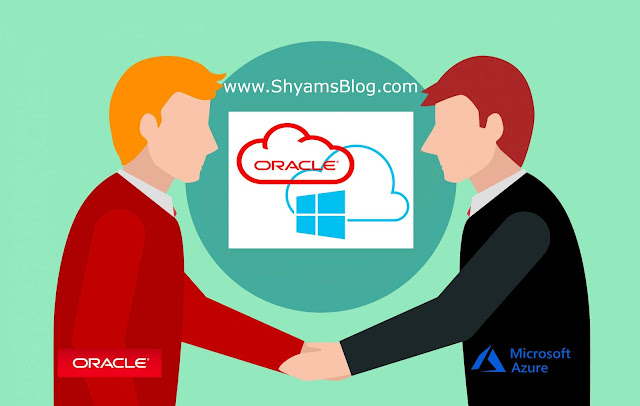Microsoft Azure and Oracle Cloud partner to directly link their clouds
Microsoft and Oracle have entered into an alliance to interconnect Microsoft and Oracle clouds aimed at accelerating Enterprise cloud adoption.
 |
| Microsoft Azure and Oracle Alliance |
Background of Microsoft - Oracle alliance
Enterprises widely use Microsoft solutions to power their business needs, and Oracle products primarily for the database and reporting needs. When the enterprises migrate their applications and data to the cloud, Microsoft products may get migrated to Azure along with third-party offerings while Oracle offerings are typically moved to Oracle Cloud Infrastructure (OCI). There is also an option of moving to AWS or Google cloud, let's set aside the cost implications of this route. This movement to isolated cloud partners can often result in strained interoperability between these multiple cloud islands.
The announcement of an alliance between Microsoft Azure and Oracle Cloud seems an industry first large scale offering, which gives customers to use both these cloud products seamlessly with greater effectiveness. This can mean that customers can also shift products cloud to cloud easily, based on the merits and also deploy applications spanning multiple clouds.
What exactly is the alliance between Microsoft and Oracle?
Microsoft and Oracle on June 5th, 2019, announced a cloud interoperability partnership enabling customers to migrate and run enterprise workloads across Microsoft Azure and Oracle Cloud. Microsoft and Oracle will partner deeply across Azure and Oracle Cloud, directly linking their data centers with high-speed links. The alliance is not just about basic connectivity, but also includes interoperability between Azure and Oracle Cloud Infrastructure (OCI) and uniting against the other cloud computing giant - Amazon Web Services. The direct interconnect is available immediately starting from the day of this announcement between the two clouds in Azure US and Oracle's Ashburn data center. This could later expand to other data centers of Microsoft and Oracle though details are not available as of now.
What does this alliance mean to customers?
- For customers using Azure services like Analytics and AI, can connect to Oracle cloud services like Oracle Autonomous Database running on the Exadata infrastructure in OCI.
- For Oracle customers, this partnership means they can deploy and run services like Oracle E-Business Suite, PeopleSoft, JD Edwards, Hyperion, Oracle Retail and other custom applications on Azure leveraging its scalability and flexibility while still using the database in Oracle Cloud Infrastructure like RAC, Exadata and Oracle Autonomous Database thereby taking full advantage of Oracle's product capabilities.
- Oracle database will continue to be certified to run in Azure on various operating
systems, including Microsoft and Linux, allowing customers to extend their on-premise data centers to both clouds.
- Applications in both Azure and Oracle clouds can connect seamlessly and work without any latency
- Unified Identity and Access Management with single sign-on experience across Azure and Oracle Cloud. It is also interesting to note that, Oracle applications can now use Azure Active Directory for identity management.
What do business leaders of Microsoft and Oracle say of this alliance?
Oracle is a natural choice for Microsoft enabling accelerated migration of enterprise applications and database to the public cloud - Scott Guthrie, Executive Vice President of Microsoft’s Cloud and AI division
Oracle and Microsoft have been long serving the enterprise needs and this partnership will enable customers to move their entire set of applications to cloud without a necessity to re-architect anything - Don Johnson, Executive Vice President, Oracle Cloud Infrastructure
Current ERP market scenario in the public cloud
Though, this partnership between these two major players raises eyebrows it is not a huge surprise considering that Oracle wants to be seen as a major player in its offerings and may have realized that it is unlikely to get to the size of Azure or AWS or Google cloud anytime soon.
It is worth remembering that, Microsoft has earlier entered into a similar pact - the Open Data Initiative with SAP and Adobe to enable their services to work better.
This announcement comes approximately six months after Workday announced that its customers can run Workday on Amazon Web Services (AWS). Workday continues to run its own data centers while this partnership with AWS gives organizations the flexibility to have their data in their own country\regions meeting their Data Sovereignty requirements. Workday came up with AWS option way back in 2016, however, only for Canadian customers and a select few customers in the US.
No comments
Please refrain for marketing messages and unnecessary back links.